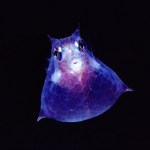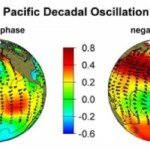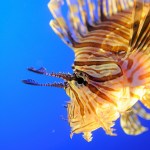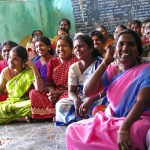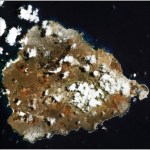ecology
Or maybe wild-ass speculation. As the data continue to come in about the E. coli outbreak in Germany caused by E. coli O104:H4 HUSEC041 (well, everything but the public health and epidemiological data which are a contradictory, incoherent mess), it appears that one of the things that has made this strain so dangerous is its ability to make Shiga-like toxin--a compound that stops cells from making proteins cells--the mechanism is similar to that of the biowarfare agent ricin (Note: there are several different Shiga-like toxins; for clarity, since it's not germane to this post, I'll lump…
Figure 1. Miniaturized radio transmitters attached to bumblebees.
(a) Transmitter attachment on a Bombus terrestris individual kept in a glass tube with opened gauze where the transmitter is fixed with superglue. (b) Nectar collecting individual of Bombus terrestris on Phacelia flower having a transmitter attached. (c) Bombus terrestris individual with attached transmitter, foraging on red clover (Trifoliumpratense).
Can you imagine being able to track a single bumblebee over the course of a day? German and Danish scientists accomplished this impressive feat. So what do those bees do all…
The vermin only teaze and pinch
Their foes superior by an inch.
So, naturalists observe, a flea
Has smaller fleas that on him prey;
And these have smaller still to bite 'em,
And so proceed ad infinitum.
Jonathan Swift, "On Poetry: A Rhapsody"
There's so much to love about this story from Nature News. While surveying genetic snippets from a hypersaline lake in Antarctica, an Australian research team found a virus that preys on other viruses. And they sorted out the ecology of the lake well enough to figure out that the virus infected by the virus-infecting virus is a major predator on the…
It really does matter: if economists are going to use biology as a model for their discipline, we need them to understand ours, to help improve theirs. But I'm getting ahead of myself.
By way of Brad DeLong, we stumble across this Russ Roberts piece discussing the question of what kind of science (if any) is economics. What bothered me in reading the original piece was how badly the biology was mangled (which doesn't give me much hope for economics). Let's go to Roberts (italics mine):
I have often said that economics, to the extent it is a science, is like biology rather than physics.…
Via Southern Fried Scientist, the Galapagos-based Charles Darwin Foundation reports:
In the aftermath of the tidal surges induced by the March 11th Japan earthquake and tsunami, a team of more than 20 staff and volunteers worked shoulder to shoulder to clear debris, retrieve equipment and clean laboratories, offices and storage buildings at the Marine Sciences complex of the Galapagos-based Charles Darwin Foundation (CDF) and Research Station on Santa Cruz Island.
The powerful surf hit Santa Cruz with waves up to 1.77m /5.8 feet above normalâ¦. The waves also coincided with the local high…
Juvenile Cowfish
Photograph by Chris Newbert, Minden Pictures
A photographer's strobe gives a violet sheen to this translucent juvenile roundbelly cowfish off the coast of Kona, Hawaii. Also known as the transparent boxfish, the roundbelly cowfish has two short horns in front of its eyes.
Stunned by the beauty of these photographs of translucent undersea creatures by National Geographic, I would like to share a few of my favorites.
Pelagic Octopus
Photograph by Chris Newbert, Minden Pictures
A pelagic, or open-ocean, octopus gives off a neon glow in Hawaii. Most species of octopus have…
The Pacific Decadal Oscillation, or PDO, affects sea surface temperatures and wind flow in the North Pacific. This graphic from NASA shows sea surface temperature departures from average, as well as wind anomalies (arrows), for different phases of the PDO. Credit: NASA JPL.
The Bering Sea, west of Alaska, gives us yet another example of "Global Weirding" - not Global Warming, with some of the coldest temperatures on record in the past four years. Chinook salmon yields have "jumped" recently in Oregon and Washington, with the third-highest recorded in 2010. Pacific Northwest salmon thrive…
Co-authored with Dr. Norma Bowe and originally published on Truthout.org.
Science and the news media sometimes occupy different worlds. Journalists rely on scientists for the latest findings, but can be drawn to controversy and provocation because it increases readership, sometimes looking for disparities to make a point. Scientists want nothing of it; their conclusions are guided by data. If a mistake is made or data are misinterpreted, any inconsistent findings are ultimately eliminated by the self-correcting nature of science.
As reported in today's Atlanta Journal Constitution, earlier…
Source.
"L" and alliterations thereof, turns out to have immense importance in literature and science. Science and art can co-exist. Surprised? Let me explain.
The creator of the infamous character "Lolita," Vladimir Nabokov, turns out to have been not only one of the most influential writers of the past century, but to have been an amateur scientist with keen insight into evolution, recently validated by modern DNA technologies.
"Lolita" is a novel that has been revered, reviled as pornography, banned and studied by scholars since its publication in 1958. I am in no way qualified to…
Lionfish
Photo source.
With New Year's resolutions on our minds, consider something out of the ordinary: not a diet to lose weight, but a diet to help the planet. Become an invasivore. Let me explain.
A recent article in The New York Times describes the invasivore diet this way:
There's a new shift in the politics of food, not quite a movement yet, more of an eco-culinary frisson. But it may have staying power; the signs and portents are there. Vegans, freegans, locavores -- meet the invasivores.
Think of invasivores as targeted ominvores, focused on eating species that invade specific…
From time to time, my office receives publisher's copies of books, uninvited and not upon my request. Today, a copy of Jay Hosler's "Evolution: The Story of LIfe on Earth" arrived. {The hubris of explaining the "story of life on earth" is unimaginable to me, but that's another story.} This piques my interest; is a careful review warranted, or should it be added to my "to do" list that increases with each semester? I fully recognize that this is a "hot button" issue, and I don't want to enter the debate per se. I am simply a curious scientist.
According to Amazon:
Product Description…
Anyone wanting to learn about Darwin's theories would do well to read his original letters. Thanks to an amazing resource from the University of Cambridge, the "Darwin Correspondence Project", you can access a treasure trove of his letters in an interactive timeline.
This resource addresses:
Darwin and Science
Darwin and Religion
Darwin and Ecology
Darwin and Gender
Darwin and Geology
Darwin and Human Nature
Enjoy the feast!
Typical letters exchanged by Darwin and his closest friend, Joseph Dalton Hooker (© Cambridge University Library)
Thanks, Karen James, for the tip!
I don't see the need to redescribe the recent paper about the discovery of bacteria that can might replace, in extremis, phosphorus with arsenic, which was overhyped by NASA, was poorly covered by most journalists, and which has compromising methodological problems (for good coverage, read here, here, and here; and snark). But what the paper does demonstrate is the importance of culturing microorganisms, knowledge about which is becoming rapidly lost by younger scientists.
With the advent of DNA-based, culture-independent techniques, where we can look at the DNA and RNA of microbes without…
Today's report of Arsenic-eating bacteria published in Science could have some unanticipated benefits: clean up and bioremediation after an oil spill. I may be off base, but here's my reasoning. Caveat: these newly discovered bacteria may not be useful in reducing arsenic levels after an oil spill if they are "fastidious" or too finicky to adapt to a marine environment. But then again, bacteria seem to always surprise us.
NASA Image Gulf Oil Spill
On May 24, 2010, the Advanced Spaceborne Thermal Emission and Reflection Radiometer (ASTER) on NASA's Terra satellite captured this false-…
Thanks, "We, Beasties" for your article on cholera.
As you pointed out:
As cholera rampages through Haiti, some epidemiologists are warning that the country could face more than half a million cases over the coming year. Yet tracking and treating the disease is proving increasingly difficult as civil unrest grips the county.
While oral vaccines are an effective approach to treating such epidemics, there is another potential tool that has proven to be effective in Bangladesh. Could this approach be used in Haiti to improve health outcomes?
Flickr mckaysavage's photostream
In a pursuit of…
Science Blogs is celebrating the beginning of the new school year with a series of 101-style posts, introducing the basics of a concept. I've got a couple of basics posts I'd like to do, but this one seemed particularly apt to me. I'm a homeschooler, but it isn't only homeschoolers that struggle with the question of how you frame our ecological situation for children in ways that are honest, not too frightening, engaging, and age-appropriate. Because most schools of every type offer a very superficial education in ecology, most parents of kids going to school will need, just as badly as…
Life transforms environments, creating ecosystems where there was once only rocks. The evolution of photosynthetic bacteria billions of years ago created the atmosphere we have today, paving the way for the evolution of larger, oxygen-breathing organisms. We humans obviously transform our environment in countless ways, but can we also engineer barren environments to be hospitable to life? Can we create new living, self-sustaining ecosystems in hostile places? Can we turn lifeless planets into second Earths through the clever introduction of life forms?
Terraforming is the (currently…
Reporting on the human microbiome--the microorganisms that live on and in us--is quite the rage these days. As someone who is involved in NIH's Human Microbiome Project, it's a pretty exciting time because the size and scale of the data we're able to generate is unprecedented.
This also means we have to figure out how to not only generate, but also analyze these data. One of the kinds of data we generate are 16S rRNA sequences, which are found in all bacteria and can be used as a 'barcode' to identify and quantify the bacteria in a community without having to culture each species. A…
Everyone's favorite Slovenian philsopher, Slavoj Žižek, discussing his provocative perspective on nature, ecology, biotechnology, and climate change while dumpster diving:
via Immanent Discursivity (thanks Nick!)
Philip Mirowski has a must-read article in The Hedgehog Review about 'The Great Mortification': the soul-searching (such as it is) that the economics profession has undergone since 2007. Two key points in Mirowski's article are really important--and are relevant to most, if not all, intellectual disciplines. The first is "This Is What Happens When You Banish History and Philosophy":
...the task is to recount these events as a sequence of otherwise avoidable tragedies, the first of which must be conceded to have been the exile of history and philosophy from any place within the contemporary…

